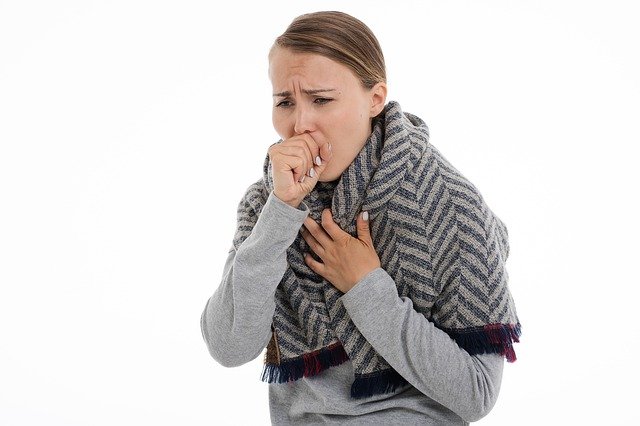
Can Ayurveda Cure Asthma Wheezing? Is a pressing questions many patients ask when their bronchial asthma condition becomes worst or when they are not getting any results out of current therapies and treatments?
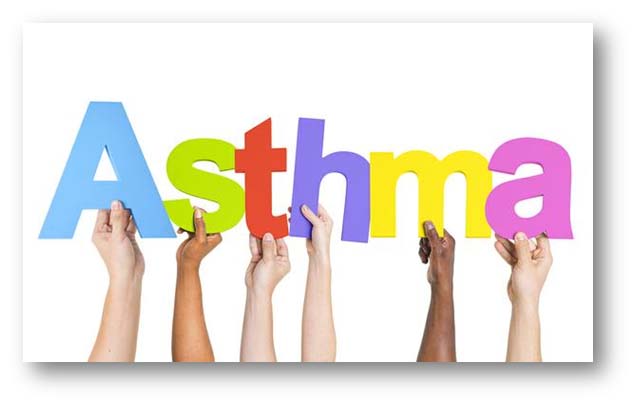
Breathing is the most natural activity, every person is born with and keeps us lively and one can enjoy everyday life without interruption. It is because of breathing that we are able to feel alive and carry out day to day activities full of energy and vitality. Breathing supplies fresh oxygen that flows into lungs and helps to purify blood.
Breathing starts the moment we are born and stops only when a person dies. Unfortunately for some, breathing is not as natural as the rest of us. That is because some people are victims of “Asthma”.
Asthma is a disease of the lungs and respiratory track that can even cause death when it gets out of control and severe. If not cured, it leads to Asthma attacks causing extreme difficulty in breathing.
There are several reasons why a person gets asthma attacks and how it gets started. In this article we are going to look at this disease from the Ayurveda perspective and find ways to control it so that the person suffering from it can live a healthy and controlled life.
Ayurveda is an ancient Indian medical text that can help look at this disease with a fresh perspective and suggest several amazing ways to control it effectively. Let’s have a closer look at how Ayurveda can help in taking control of this deadly disease.
Table of Contents
What is Asthma as per Ayurveda?
The wetness present in the lungs is called asthma. In Ayurveda, asthma is known as “Shwas” which is related with “pran-vah-strotas”.
A lung condition which affects regular breathing is called Asthma. Difficulty in breathing or shortness of breath is termed as shwas (asthma).
As per Ayurveda, it occurs from stomach (amashaya) diseases, settled in chest portion along with kapha. These start to block the movement of Vyan Vayu. So this condition is mainly caused by vata and kapha dosha
.
Wicked kapha blocks the channels of pranavah (respiratory system ) and anna-udakvah (digestive system) strotas, which carry prana (energy) and (food -water) all over the body. This pranavah (respiratory) system as per western science includes, heart, lungs and other structures like pulmonary artery and veins when wicked form shwas (asthma).
Asthma is the chronic inflammatory disease of airways. In asthma patient, it is difficult for Air to move in and out of the lungs, which ultimately causes shortness of breath, coughing, wheezing, chest pain or tightness and sweating.
Lungs are made with foam of blood as per Ayurveda, with this definition of lungs we can understand the relation between blood and lungs at the same time, Pitta is also related with Rakt (blood) which flows all over the body along with pitta.
That’s why asthma is co-related with Pran Vayu, UdaanVayu, Kledak kapha, Avalmbak kaph.
What are the primary reasons of Asthma and related diseases as per Ayurveda?

Asthma can be caused due to so many following reasons and co- morbidity disease as per Ayurveda
- Obesity
- Allergy like pollen grains, chemicals, smoke, perfumes or food
- Animal hair or fur
- Pollution, dust, smoke.
- Heavy exercise and heavy work
- Stress, anxiety
- Cardiac problems
- Hemorrhoids problems
- Liver diseases
- Genetic
- Wrong combination food, too sweet products, too sticky and cold food (like milkshakes and ice-creams)
- Anemia
- Recurrent sinusitis
- Cold weather and cold food
- Due to Fever, vomiting and severe diarrhea
- Due to poisoning
- Viral respiratory illness during childhood
- Drugs like aspirin or painkillers
- Suppression of natural urges
Symptoms and Types of Asthma as per Ayurveda?
- Runny nose, sneezing
- Hey fever
- Cold, cough
- Breathing difficulty along with forcible expiration
- Dry or wet cough
- Thick mucus sputum
- Patient gets comfort in sitting position
- Wheezing sound while breathing
- Chest pain or tightness
- Weakness in body
- Aggravation of breathing problem during night and early morning hours
- Fainting
- Sweating
- Dryness of mouth
Types of asthma: Ayurveda describe 5 types of asthma
1) Mahashwas (major dyspnea) –
Shortness of breath , person becomes miserable, loud and wheezing sound while breath, person behaves like a mad bull, fainting, palpitation, ear, eye and headache.
2) Urdhwashwas (expiratory dyspnea)–
Person can exhale out long and loud breath but cannot take long breath in, can’t talk due to constant coughing, constant eye movements.
3) Chinna shwas (chynestroke respiration) –
Irregular breathing , aching allover body , sweating, fainting, abdominal distention, urine incontinence, redness of eyes can be seen.
4) Kshudra shwas (dyspnea minor)–
Due to vigorous exercise or work, vata increases and causes kshudra shwas, which reduces on its own.
5) Tamak shwas (bronchial asthma) –
Sticky, sweet and cold food increases kapha and vata, due to cold weather tamak shwas is started. In Tamak shwas, more breathing issues occur when patient lies down, but when the patient is sitting down in upright position it gets settled down.
Tamak shwas is of two types, Pratamak shwas and santamak shwas. Pratamak is associated with fever, fainting, distention of abdomen & indigestion. Santamak is pacified by taking cold regimen.

What are the diagnostic test for Asthma ?
- Pulmonary function test which includes spirometry & peak flow which estimates the narrowing of bronchial tubes and breathing rate of patient.
- Chest x-ray to differentiate asthma with other lung disease.
- Allergy test to find if any allergens causing asthma
- Exhaled Nitric oxide test to confirm the bronchial asthma
- Challenge test which includes methacholine and mannitol. If these are present, then the Airway causes a spasm when an Asthma patient inhales them.
- Blood test like blood eosinophil count, serum IgG test are also useful to know the infection.
How does Ayurveda detect and treat Asthma?
Line of treatment used by Ayurvedic doctors includes asking questions about past diseases, lifestyle, eating habits, does any family member already suffers or not etc.
Does “pulse examination” help detect Asthma?
Pulse examination is the key method to diagnose a disease in Ayurveda.
An Ayurveda physician can identify vata, pitta or kapha dosha, their toxicity or in- toxicity, which dosha has increased more or less.
With all above dosha quality and factors Ayurveda physician can, diagnose not only asthma but also old and future diseases the patient is likely to suffer from.
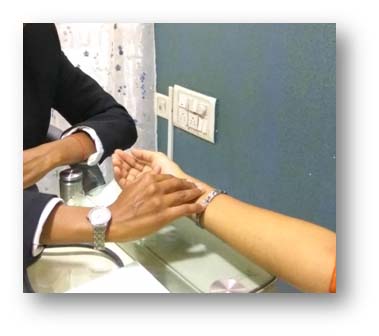
What triggers asthma and Asthma attacks as per Ayurveda?
There are so many causes which can trigger asthma. Like pollen allergy, stress, cold weather, cold food, infection, smoking, pollution and many others.
What time of day is asthma worst?
Asthma can trigger more in the night time and early morning time too. This is time when “vata” ia aggravated as per Ayurveda, which triggers the asthma.
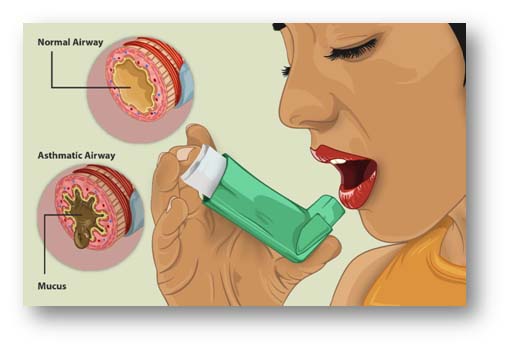
Why is my asthma so bad at night?
As per western studies some experts say they don’t know the exact cause why asthma is more during night time but some say that, when we are resting down at night our stress hormone releases cortisol which causes inflammation of airways and causes asthma more during night hours.
But as per Ayurveda, this is the time for vata and kapha. In the night time and early morning hours vata starts to move in the body and make movements easier for kapha too for its production and distribution in the body. Because of this chest is full of kapha. Normally vata along with kapha starts to move in body and forms this condition called Shwas (asthma worsens in night hours).
What is the best position to sleep in when you have asthma?
Lying on left or right side is the good position rather than on back. Lie down on back with head elevated and knees bent with the support of pillow under the knees.
Or
Second position: Lie on your side (left or right) with a pillow between your legs and head should be elevated with pillow and keep your back straight not bent.
Is Cold air bad for asthma?
Cold air is dry & dryness is always related with vata, increasing irritations and swelling of the airways. This greatly increases the possibilities of Asthma attacks.
Is there any replacement for Asthma Inhaler in Ayurveda?
Inhalers relax the muscles which tightens your airways during an attack. Inhalers helps to open airways channel to breathe easily. This is very fast but short acting medicine as it acts for short time only.
Ayurveda treats Asthma by finding out the root cause of asthma. In Ayurveda there are some special herbs and combinations which help to relive the asthma attack suddenly and also treat it. These are :
- Vasa (adathodavasika)
- Kantakari (solanum xantocarpum)
- Sunthi (dry ginger )
- Yashtimadhu (licorice)
- Vacha (calamus)
- Honey , chyvanprash , agastyarasayan.
Some combinations like sitopaladi churn, talisadi churn, shwaskuthar tablets, mahasudarshan churn, somalaytachurmn and many others as per patient’s age, symptoms and season are used to treat the asthma.
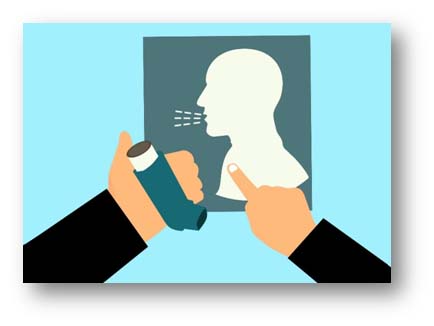
Ayurvedic Emergency Asthma Treatment Without Inhaler
- Ginger is the best emergency medicine for asthmatic people. So ginger tea with 4 pieces of clove is the good emergency remedy for asthmatic people.
- Cinnamon with honey is another good combination to prevent the breathing issues in asthmatic attack. 1 tsp honey mix with ¼ tsp cinnamon is recommended.
- Some combinations like sitopaladi with talisadi consumed with warm water is also helpful.
Shwaskuthar ras tablets works nicely. - Pippali churn or trikatu (ginger, long pepper, black pepper) also reduces the attack.
Resins 8 + ¼ tsp cinnamon + ¼ pippali + ½ tsp clove powder + 2 tsp ginger juice mix all this together which reduce the airway inflammation.
(Please note above therapies or combination of ayurvedic medicines must be consumed only by proper advice under any Ayurveda physician)
Is it true, that Asthma can never be cured, but can be kept under control?
Yes, as per Ayurveda, asthma is “yapyavyadhi” which means it can be cured for certain time period only, which means regular medicines and diet with follow up under Ayurvedic physician, maintains asthma.
Diet is the first prior treatment as per Ayurveda. Asthma is easy to control if you are following special diet, medications and doing regular panchakarma procedure under ayurvedic practitioner’s guidance with regular practice of yoga and pranayama.
What are some behavioral precautions an asthma patient must follow?
There are many, but the most important ones are
- No cold food
- No exposure cold weather
- No smoking.
Is fasting good for asthma?
Yes, fasting does help in reducing asthma. To reduce production of kapha asthma patients must eat just one time, preferably at lunch hours. Asthma patients must avoid food and fruits after 6pm so that production of kapha is under control. Fasting also increases lung volume along with pulmonary function.
Is steam intake good for asthma?
Steam intake starts to open up the sinuses blockages and helps to release the kapha. Aasthmatic patients must try to consume steam with tulsi leaves or eucalyptus oil twice a day for good results.

Is consuming hot water good for asthma?
Of course hot water reduces the vata and inflammation of airways. This is good for melting out your kapha and that’s why drinking hot water is always good.
What types of food are allowed to control asthma?
Food plays important role in human life. As someone says “Nature is very smart it puts medicine inside the food”. So, what we are eating is very essential. For asthma patients, food in less quantity acts just like medicine.
Food which is fresh, warm cooked and with lot of vegetables is digested nicely because it does not produce excessive kapha in body.
Foods like Honey, turmeric, Ghee, fruits, tulsi, garlic, chyavanprash, cardamom, cinnamon, ginger, clove, green leafy vegetables like spinach, carrots, beet root are helping to reduce the kapha production and help to relieve the asthma too.
What foods should you avoid with asthma?
Asthma can be triggered with some food products or combinations of them, for example fruit salad. Some people have allergy with some types of food product which causes aggravation because these foods act like food allergens and when asthmatic people come in contact with them it causes asthma attacks.
Foods or combination of foods like Egg, milk, rice, coke, sugar, chocolate, mutton, chicken, curd, lemon, papaya, tea, frozen, preserved food, sour fruits, fermented food, fruits with milk or yogurt, vegetables with yogurt or milk can trigger asthma attacks and also can cause skin infection.
As you can see above mentioned food or their combination with other types has different taste which can produce the bad quality kapha with toxins in the body. So avoiding such type of food is good to control the asthma.
Is Asthma condition related to stress, anxiety and related mind conditions?
Asthma is not a psychological condition; emotional stress can trigger the symptoms. It is a long term chronic inflammatory disease that leads to sensitive and irritated airways specially when its untreated.
For e.g. Death of a family member, work load, financial problems can trigger symptoms of asthma.
Does Yoga help to relive Asthma conditions?
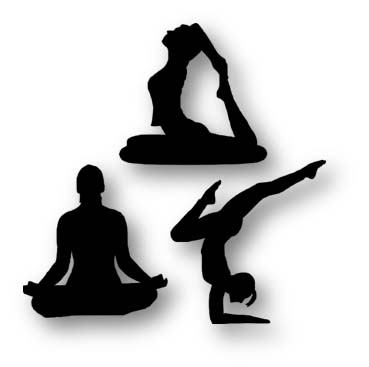
Yoga helps to open up your airways, slow down respiratory rates, relieve stress and control asthma attacks , improves breathing. The following yoga poses help greatly in controlling asthma.
- Bhujangasana
- Shavasana
- Machendrasna
- Vrukshasna
- Setubandhasana
- Adhomukhshwanasana
- Baddhakonasana
- Nadishodhana pranayama
- Kapalbhati pranayama.
Are there any Ayurveda and Panchakarma therapies for Asthma?
Panchakarma treatment are :
Vamana:
Induce to vomit out kapha and reduces the imbalance of dosha from gastro-intestinal tract, with the help of medicinal herbs like licorice, sweet flag, emetic nuts, saindhava, calamus root.
Virechana:
Iinduce purgation with herbal cleansing preparation that bring toxin elimination through anal route.
Nasya:
Pouring medicated oil or ghee as per patient’s symptoms into each nasal passage helps to relieve the kapha from its sinuses points too.
Abhyanga & swedana:
Applying medicated oil or oil mix with saindhava (salt) helps to relieve kapha from body especially on chest part and back. After abhyanga, a treatment called swedana (fomentation)is recommended to liquify and throw out this kapha with the help of Vamana and Virechana.
Rasayan therapy:
After panchakarma treatment some oral medications are recommended by physician along with special diet to build the immunity, normalize the function of the body and to prevent the disease from relapsing.
Rasayan therapies are fighting disease for long time and increases new cells within the body to fight against disease. This may include some medicines like Chyavanprash, Amrut Rasayan, pippali Rasayan, Haritaki Rasayan, Agastya Haritaki Rasayan and many more.
“Ayurveda is an Indian traditional science and if you follow it thoroughly, you can maintain your health and mind nicely”
For more detail information about home remedies and medication do contact us or near your Ayurveda physician.
Written By…
|
Dr. Pallavi Shinde is the director at Shree Vishwamukta Yog, Ayurved and Panchakarma Clinic at Pune, India. She always uses ayurvedic proprietary formulations for many chronic health diseases & many products for Skin Diseases & beauty products. She is a hardcore Researcher, Practitioner, Promoter of Ayurveda. Contact today to book an appointment. |
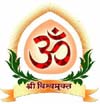

Thanks for the informative article.